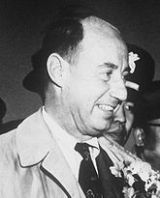
, noted for his intellectual demeanor, eloquent oratory
, and promotion of liberal causes in the Democratic Party
. He served as the 31st Governor of Illinois
, and received the Democratic Party's nomination for president in 1952
and 1956
; both times he was defeated by Republican Dwight D. Eisenhower
. He sought the Democratic presidential nomination for a third time in the election of 1960
, but was defeated by Senator John F. Kennedy
of Massachusetts
.
The whole notion of loyalty inquisitions is a national characteristic of the police state, not of democracy. The history of Soviet Russia is a modern example of this ancient practice. I must, in good conscience, protest against any unnecessary suppression of our rights as free men. We must not burn down the house to kill the rats.![]()
Communism is the corruption of a dream of justice.![]()
Laws are never as effective as habits.![]()
Man does not live by words alone, despite the fact that sometimes he has to eat them.![]()
A hungry man is not a free man.![]()
Words calculated to catch everyone may catch no one.![]()
What counts now is not just what we are against, but what we are for. Who leads us is less important than what leads us — what convictions, what courage, what faith — win or lose. A man doesn't save a century, or a civilization, but a militant party wedded to a principle can.![]()

